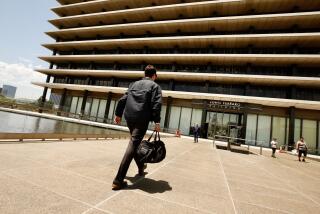Judge delays release of DWP employee names with pay data
The union representing Los Angeles Department of Water and Power employees won a temporary restraining order Tuesday, preventing the release of workers’ names with their salaries until each employee has had more time to argue that the identity disclosure could pose a safety risk.
The names of DWP employees who don’t file an objection via their union will be released May 21, election day in the city mayor’s race.
The decision, by Los Angeles County Superior Court Judge James C. Chalfant, essentially removes DWP management from the process of notifying employees that the agency’s payroll data has been requested by The Times.
It also restarts a vetting process for release of names, job titles and salary information for DWP employees requested by The Times in February. A database containing the pay information, but no names, was released Tuesday.
That data showed that the average total pay for DWP employees, from the highest-paid engineers to the lowest-paid temporary workers, was $101,237 in 2012.
That’s up 15% from an average of $88,299 in 2008. By comparison, the median household income of Los Angeles residents — the municipal utility’s customers — declined over roughly the same period according to the latest data available from the U.S. census.
On Wednesday morning, the International Brotherhood of Electrical Workers, Local 18, which represents the vast majority of DWP employees, went to court asking for more time to let employees explain why their names shouldn’t be made public.
Payroll information for government agencies is routinely made public under the law. In rare cases, judges have allowed exceptions for individual employees, such as undercover police officers, who fear for their safety, or people who have restraining orders against potentially violent stalkers.
Following The Times’ request, DWP administrators sent emails to all employees in mid-March, giving them until April 16 to object. Roughly 800 employees responded, and just over 100 provided some documentation to back up their claim.
But some employees might not have received the message, union lawyer D. William Heine told the court Wednesday. “A lot of DWP employees don’t sit in front of computers all day looking at email,” Heine said. “They’re climbing poles, driving trucks and digging ditches.”
Chalfant granted the union more time, and put it in charge of the notification process. On May 21, he ordered, the names of any employees who haven’t filed an objection with the union will be released.
Asked after the hearing if there was a reason he chose election day for the initial information release, Chalfant said, “No, not at all.”
Employees who do object will have to prove to the court that their safety concern is legitimate.
DWP compensation has become a central issue in mayor’s race since the IBEW, Local 18 gave $1.45 million to an independent effort backing City Controller Wendy Greuel. That makes the union the single biggest cash contributor to either candidate.
Ultimately, the list of DWP employees who are able to show a legitimate safety concern will be very short, Chalfant warned the union. “The paradigm is the undercover police officer whose cover will be blown, and even then it’s hard to show,” he said.
ALSO:
DWP average pay rose 15%, despite flagging economy
L.A. mayor candidates urge DWP to release pay records
DWP union tries new tack to block release of payroll data
@jackdolanLAT
More to Read
Sign up for Essential California
The most important California stories and recommendations in your inbox every morning.
You may occasionally receive promotional content from the Los Angeles Times.










